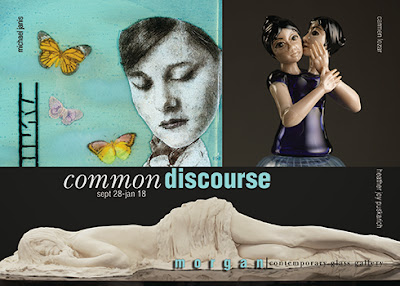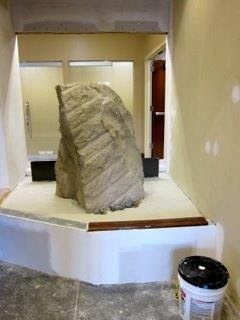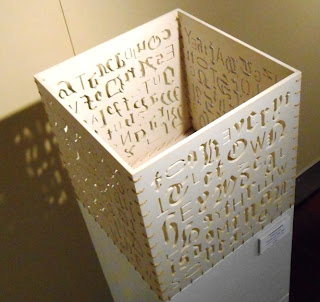 |
| UK Glass artist Susan Ratliff in Washington, DC |
UK glass artist Susan Ratiliff has recently completed her Residency at the Washington Glass School, and we catch up with her for an interview about her experience.
Why an artist residency?
Studying Glass at Sunderland University while an amazing opportunity, is driven mainly by the acquisition of skills and knowledge. Work is created to titled assignments until the second semester, where self directed work begins. Even self directed work is overseen and influenced by tutors. By undertaking this residency, I feel it has allowed me to breathe and focus on what I wish to explore and gain confidence in myself as an emerging artist. That is not to say I wish to work in isolation and certainly within the community of artists that work out of the Glass School, artists do seek others perspectives on their work.
Why did you apply to Washington Glass School specially?
Almost eighteen months ago Michael Janis and Tim Tate, Directors at Washington Glass School were awarded a Fulbright Scholarship and came to Sunderland University where they ran a series of Masterclasses and Seminars.
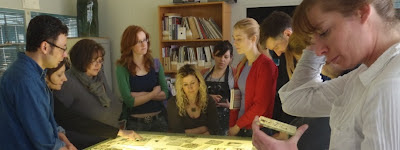 |
| Michael Janis (left) teaching Masterclass in glass at University of Sunderland, 2012. |
I was fortunate to attend all the Masterclasses and the Seminars. I found the workshops very informative and interesting and was excited by the new techniques shared. More specifically I was very impressed by Michael and Tim – the quality of teaching, preparation and expectations were outstanding. I do not use these words lightly, having been a school’s inspector in my previous career. Their passion and dedication were infectious and I wished I could emulate these traits as an artist. We have had various international artists visit University but these two stood out for me as exceptional. I also felt there was a cultural difference in the attitudes to glass art in America as compared to England. I wanted to learn more, and at all the levels and nuances. All of these factors contributed to me wanting to apply to Washington Glass School.
Did the residency live up to the expectations you had?
Prior to coming to the US, I was filled with a combination of equal parts nerves and excitement. I wasn’t sure what to expect and didn’t want to let them and myself down.I knew I was prepared to be positive, and to do the best I could and work hard.
The residency has certainly exceeded what I had ever envisaged. I have been given so many opportunities and such valuable mentoring that I am shocked that in such a short time, I feel more confident in myself as an artist.
I have seen at first hand the diversity of work that exists in a working artist studio, and also the hours that are needed and a glimpse of the challenges to be faced.
How did you find the living and studio conditions DC? Did you feel at home?
One of the biggest challenges for me had being finding somewhere to live that was both affordable and safe. Washington, DC is the capitol of the United States and is an enormous and diverse city. I emailed Michael earlier, asking the specific location of the Glass School as I wanted to look at commuting and not trying to get across the city. From this point I can only say “God bless Google”! I asked how safe certain metro stations were for single white females and got great answers online. I went for a Guest House in Columbia Heightsand it has been fantastic, I feel I am living in a neighborhood, yes there is an energy and a vibrancy but it feels great! It is down the street from interesting shops and restaurants and a DC metro station. I would return to it and recommend it to others too.
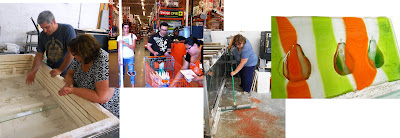 |
| Susan Ratliff talking with Sean Hennessey; getting studio supplies at Home Depot, enjoying the sweeping compound, and making kilncast glass artwork. |
On my first day Michael was here to welcome me and began by giving me a tour of the studio. Within the first few minutes he had identified a working space that was designated for me alongside Audrey Wilson, Artist and the Glass School Studio Coordinator and also amongst the other studio artists. This really made me feel very welcome and I hadn’t expected it. Having worked at Sunderland it was lovely to see familiar equipment and the sweetie-like jars of Bullseye frit. One thing new to me was sweeping compound and I am the first to admit I think I got a little too excited by this! Audrey made me feel very welcome,she is very approachable and patient. When practicing skills as simple as glass cutting, she was so encouraging – she enables you to believe you can do it.
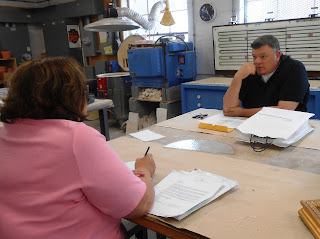 |
| Susan Ratliff and Tim Tate discuss glass art. |
Tim Tate – who had a very exacting schedule, was preparing to be out of state on an art tour with the Smithsonian’s James Renwick Alliance group, was very generous in giving his time when he was here. And Michael made a point of introducing me to all the artists in the School and encouraged me to inquire and discover more about their work.
I found the School very well equipped and well resourced. It has seven kilns of various sizes, cold shop and mold making areas, as well as some metal work facilities too. I think it is extremely well resourced.
What was your day like?
My days were varied but generally we began the day at 9:30 and worked through till after 5:00.
Some of the studio tasks included assisting Audrey in making the glass awards for the DC International Short Film Festival. Cutting glass, cleaning out kilns and talking to artists about their work. Making my own work. Going to Galleries, Museum exhibitions and lectures. Learning to blog and be a photographic model….I felt these last two weren’t my strengths.
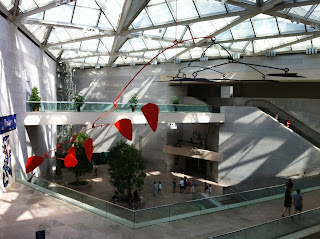 |
| Susan was able to take advantage of the different museums, and loved the National Gallery of Art. |
On a studio-based day, I would generally start by asking Audrey if she had any tasks. If not, I would update my blog and then talk to one of the resident artists, including artists from some of the adjacent ceramic studios, about their work.
 |
| Susan works at the dry plaster casting technique to create some glass studies. |
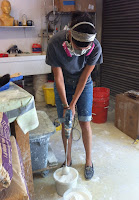 |
| Audrey mixing plaster. |
Following on from this and after a quick bite of lunch, I would work on a piece of my work to go into the kiln. While here I have been working on the Dry Plaster Technique for kilnforming glass, following on from the Fulbright Masterclass in Sunderland. On days when my work was out of the kiln in the morning, I would take it out and prepare the kiln in case anyone else needed it.
How did you make use of the facilities?
Our final year is a self directed module and so I to the opportunity to make a start on exploring an artwork idea that I had. I was assigned a kiln to use for work and carried out several test pieces exploring size, color and shape,all of my work was using dry plaster casting.
 |
| Susan’s workspace is covered with glass components made during her residency. |
It was excellent to have the time to experiment, it felt quite liberating! I used 1/4 inch window glass and various colored frit and colored plate glass. I made the dams, sifted the plaster, cut the glass and used various found objects -some were more successful than others, but that is the nature of testing and the beauty of glass.
 |
| Susan notes that the USA has still not switched to metric, and must measure in imperial. |
Do you get feedback on your work during studio visits?
I got excellent feedback throughout the process. Whilst setting up the kiln Michael would come over and ask questions such as Why are you doing……? What do you expect to happen if ……? The whole process made me think much more. When the work came out we would talk about the technical aspects what had worked well what not so well and happy accidents! I also felt I really benefited from discussions about my concept for my work. It is the first time I have felt mentored and found it invaluable and something I hope could continue.
Would you like to stay in DC after you’ve finished?
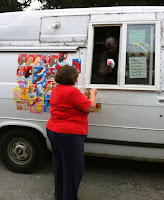 |
| The ice cream truck arrives in time. |
The first reaction is yes! I feel I have gained so much more from the whole experience. On a management course once a speaker described that often we live our lives holding a beach ball in front of us, and only seeing the world from that angle, and we should appreciate other people have a totally different view to us. I think coming here has given me a very different view. The way I have seen artists approach the work here in America is different to what I am used to, and sometimes feel that history and tradition really influences how people think – and I wanted to challenge myself by developing other methods and processes.
Luckily, I had got a grant from the University that helped offset some of the costs in doing the residency. I am very lucky to have American friends that live in the neighboring state of Virginia, so knew they would support me and they did. Collecting me from the airport and having me on the weekends as well as providing me with food parcels – as though there were no food stores in the city of Washington! My friends and I were able to pop up to New York for a weekend escapade and took in a Broadway show before coming straight back to work at the studio.
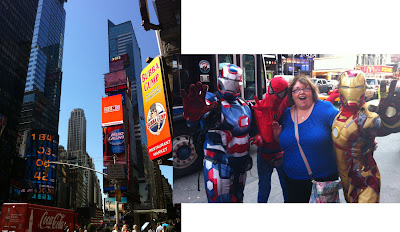 |
| Bright lights, Broadway, Big City – Susan felt like she was in an alternate world. |
I have loved it and would love to return……the question is, Would they have me back?!









